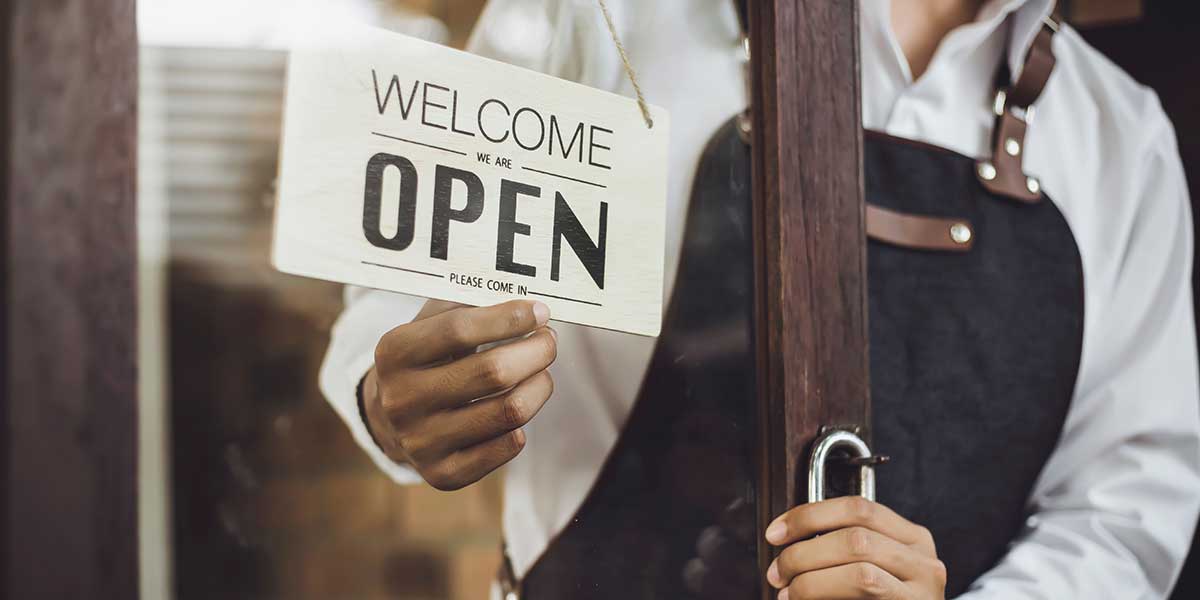Opening a restaurant is a truly exciting time. If you're working towards opening the venue of your dreams, your mind is likely racing with ideas for your location, menu and more.
One area you might be putting off thinking about is licensing. You might think that the various administrative and legal considerations involved are a major hassle.
While restaurant licensing can initially be complex, our complete guide will give you the key information you need to prepare your venue for a grand opening.
What are restaurant licences?
Restaurant licences are legal documents that permit venues to do certain things. Without them, it is not possible for a venue to operate within the bounds of the law.
Restaurant licences cover everything from the legal service of food and alcohol, to fire safety to the rights to play copyrighted music. The licensing process ensures that restaurants conduct business in a regulated way.
It also ensures restaurant owners have access to all the information they need to conduct their business. While the process can seem somewhat tedious, it's a crucially important part of operating a venue safely and legally.
What licences are required to open a restaurant in Australia?
The following is a general overview of restaurant licensing in Australia. Remember that not all of these licences may apply to your specific venue. Likewise, this is not an exhaustive list of all the legal documentation that may be required for all restaurants.
Licensing is generally carried out at the state and local level. This guide provides a more comprehensive overview of licensing around Australia. You should contact your local jurisdictions for more information.
Food business licence
Food business licences are required to ensure that hospitality venues serve food to customers in a safe manner. Throughout Australia, the acquisition of a food business licence is primarily deferred to local councils. Councils distribute licences in line with the legislation and regulations of their state governments.
Food safety supervisor certificate
Certain food businesses such as restaurants require a food safety supervisor (FSS) to oversee food handling operations and manage potential risks.
Though Australia's various jurisdictions have different rules surrounding food safety supervisors, there are courses available that are recognised in all 6 states and both mainland territories. You can find a list of many of these providers on the NSW Food Authority website.
Once the training course has been completed, food safety supervisors must be able to train and supervise other people in the business to ensure safe food handling occurs. Supervisors must also be "reasonably available" and "easily contacted".
The NSW Food Authority suggests that for small businesses, it may be most appropriate for the owner to be the FSS. Larger businesses can nominate multiple FSSs to be trained and appointed.
Liquor licence
For restaurants that wish to sell alcohol, there are many different forms of liquor licences available. The relevant licence often changes from jurisdiction to jurisdiction.
For instance, in NSW, most cafes and restaurants require an on-premises liquor licence. In Victoria, there is a dedicated restaurant or cafe licence. If your venue is considered a club, you will often require a club licence.
There are different rules if you want to be a bring-your-own (BYO) venue. These are venues in which customers bring in their own liquor for consumption.
You will generally need to submit a different type of liquor licence application. Different regulations also apply if you want to exercise the right to serve alcohol without also serving a meal.
For most jurisdictions, you can apply for a licence to sell liquor on your state government website. When applying for a liquor licence, you will be asked to include a range of relevant information and prove certain conditions are met.
Some conditions that may be required for a liquor licence to be distributed include:
- Free drinking water must be available to patrons
- Licencing must be displayed at the front of the premises
- An incident register must be maintained if the premises regularly have trading hours past midnight
In some jurisdictions, you must have a National Police Certificate when applying for a liquor license.
Throughout Australia, employees who supply liquor also require their own accreditation. This is widely known as the Responsible Service of Alcohol.
The exact nature of this accreditation varies from state to state. For instance, the Australian Institute of Food Safety's RSA course is only recognised in Queensland, Western Australia and the Northern Territory.
Fire safety certificate and statement
In some jurisdictions, fire safety certificates are to be obtained by building owners rather than the owners of specific businesses. For instance, this is the case in New South Wales.
However, in other areas such as Queensland, there is a joint obligation for obtaining documentation between owners and occupiers.
Opening a new restaurant can in some cases have implications for fire safety certification, even if the building is already fire safety certified. For instance, in NSW, if a building has "changed use", a new fire safety certificate must be obtained by the building owner.
In addition, some jurisdictions require annual certifications or statements. Fulfilling these obligations is thankfully less taxing than obtaining the initial certificate.
Here's a quick overview of annual fire safety obligations in each state and territory:
- Australian Capital Territory: An Annual Verification Certificate is required.
- New South Wales: An Annual Fire Safety Certificate is required.
- Northern Territory: No annual submission is required.
- Queensland: An Annual Occupiers Statement is required.
- South Australia: An Annual Certificate of Compliance is required.
- Tasmania: An Annual Maintenance Statement is required.
- Victoria: An Annual Essential Safety Measures Report is required.
- Western Australia: No annual submission is required.
Music licence
A music licence for restaurants is unique in that it is not distributed by the government. OneMusic Australia provides licences to restaurants, cafes, pubs and other dining venues.
These licences allow venues to play copyrighted music, with the "majority of the world's music" covered. This licence ensures that musicians are fairly compensated for the usage of their music.
The good news is that obtaining a music licence from OneMusic Australia is a relatively straightforward process. You can head over to the OneMusic Australia website and apply there.
Outdoor dining permit
Outdoor dining is a great way to maximise your venue's floor plan. However, taking advantage of outdoor dining is not as simple as putting some chairs and tables out the front of your venue.
In Australia, outdoor dining permits are provided by your local council. You will need to adhere to the restrictions imposed by your local jurisdiction.
These restrictions may include:
- You have a suitable area within the building to store outdoor dining furniture at the close of each day's trade.
- The premises have a clear and unobstructed view of the outdoor dining area.
- If you wish to use an outdoor area in front of a neighbouring property, you need to get a letter of consent from the owner of that property.
- Minimal fences or boundaries should be imposed.
- Adequate clearances with other public use of spaces must be adhered to.
Building certificates
The need to acquire building certificates will vary from restaurant to restaurant. If you are moving into an area that was previously being used as a restaurant, the need for new certification is likely minimal.
However, if you are renovating an older building or constructing an entirely new one, these certificates will become relevant.
As with many other licences, building certificates vary significantly from jurisdiction to jurisdiction. Consult your local governments for more information.
Some forms of building certification that may be relevant for your business are:
- Construction certificate: Before beginning construction, you will likely need to obtain a construction certificate. This ensures that any building that takes place has development approval.
- Compliance certificate: Compliance certificates are usually required when building work is completed. They are used to verify that a building is compliant with laws and regulations.
- Zoning certificate: Zoning certificates are issued by local councils. They apply to the use of property and any relevant restrictions. This includes any development that may take place on the property.
- Occupation certificate: An occupation certificate ensures that a building meets relevant regulations and is fit for its intended purpose. They are necessary before beginning occupancy on a new building, or when changing the intended usage of a building.
Trade waste permit
Throughout Australia, regulations apply for the discharge of commercial wastewater. Trade waste permits are generally necessary for restaurants due to the health and environmental risks of trade wastewater.
It is generally necessary to apply for trade waste permits from water providers such as Sydney Water or Melbourne Water.
In order to receive a trade waste permit, you may be required to pre-treat your wastewater to limit the presence of substances like suspended solids, fats, oils, grease, heavy metals and flammable liquids.
More tips for opening a restaurant
Licensing is just a small piece of the puzzle when it comes to opening a new restaurant. Here are some
- Create a business plan: A great business plan can be instrumental for a new venue in several ways. It is the ultimate master document including a SWOT analysis, mission statement, market analysis and much more. It can also be very useful for securing funding and hiring your initial employees.
- Hire the right staff: Your first hires for your new restaurant are some of the most important. We have a wealth of information available when it comes to making these all-important decisions. Check out our full guides to attracting staff to your venue, interview questions for restaurant managers and hospitality sample job description examples.
- Integrate technology: Integrating technology into your venue from the outset can yield big rewards in the long run. A comprehensive table management system like ResDiary allows you to dispose of your paper diary and take digital reservations. You can also implement technology like electronic point-of-sale and inventory management systems for maximum efficiency.
Get ready for a grand opening with ResDiary
When opening a new venue, you need all the help you can get. That's why ResDiary is jam-packed with features to assist you in running your restaurant.
Make your paper diary a thing of the past and go all-in on digital reservations. This makes it easy to manage the floor each and every night. You can even use ResPhone to take calls and automatically input them into your digital reservation system.
ResDiary also has over 60 integrations including EPOS and property management systems to make life even simpler. Book a demo today and let ResDiary guide you through the world of hospitality.



